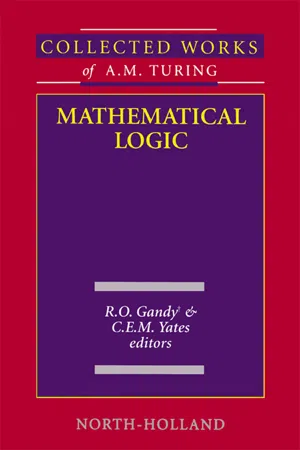
Mathematical Logic
R.O. Gandy,C.E.M. Yates
- 306 Seiten
- English
- ePUB (handyfreundlich)
- Über iOS und Android verfügbar
Mathematical Logic
R.O. Gandy,C.E.M. Yates
Über dieses Buch
Mathematical Logic is a collection of the works of one of the leading figures in 20th-century science. This collection of A.M. Turing's works is intended to include all his mature scientific writing, including a substantial quantity of unpublished material. His work in pure mathematics and mathematical logic extended considerably further; the work of his last years, on morphogenesis in plants, is also of the greatest originality and of permanent importance. This book is divided into three parts. The first part focuses on computability and ordinal logics and covers Turing's work between 1937 and 1938. The second part covers type theory; it provides a general introduction to Turing's work on type theory and covers his published and unpublished works between 1941 and 1948. Finally, the third part focuses on enigmas, mysteries, and loose ends. This concluding section of the book discusses Turing's Treatise on the Enigma, with excerpts from the Enigma Paper. It also delves into Turing's papers on programming and on minimum cost sequential analysis, featuring an excerpt from the unpublished manuscript. This book will be of interest to mathematicians, logicians, and computer scientists.
Häufig gestellte Fragen
Information
Introduction to: Computability and Ordinal Logics
Historical Introduction
Paper 1. On Computable Numbers with an Application to the Entscheidungsproblem
Inhaltsverzeichnis
- Cover image
- Title page
- Table of Contents
- Collected Works of A.M. Turing
- Copyright
- Dedication
- ACKNOWLEDGEMENTS
- PREFACE
- ALAN MATHISON TURING – CHRONOLOGY
- PREFACE TO THIS VOLUME
- Part I: Computability and Ordinal Logics
- Part II: Type Theory
- Part III: The Enigma, Mysteries and Loose Ends
- BIBLIOGRAPHY
- CONTENTS OF OTHER VOLUMES
- APPENDIX: MATTERS ARISING FROM EARLIER VOLUMES